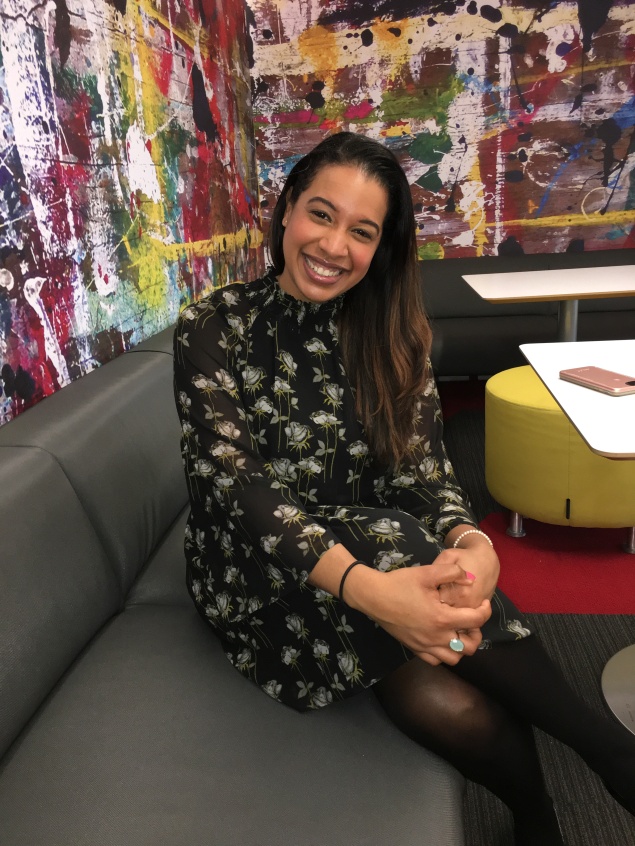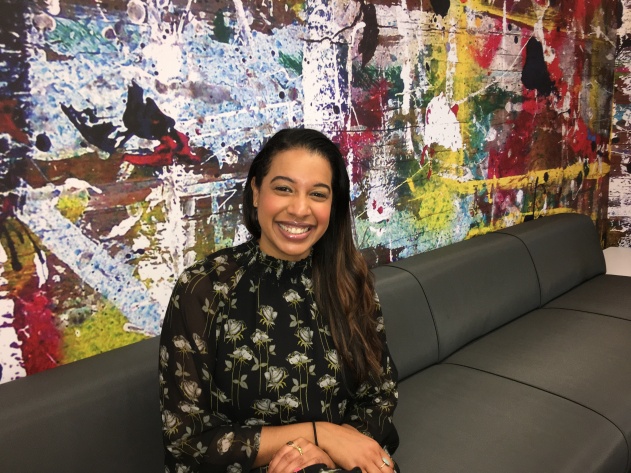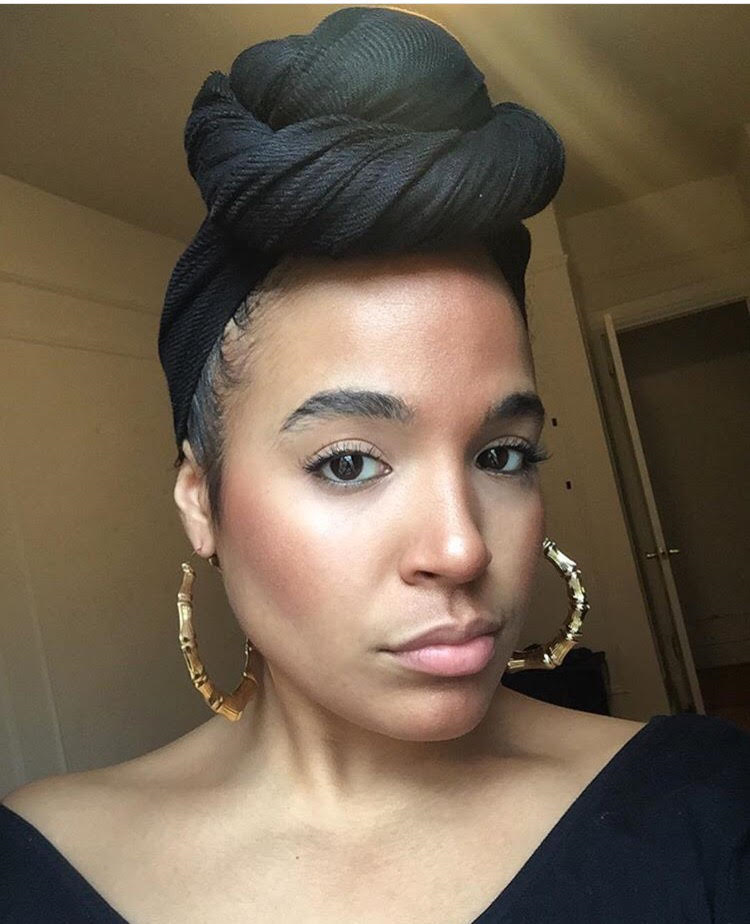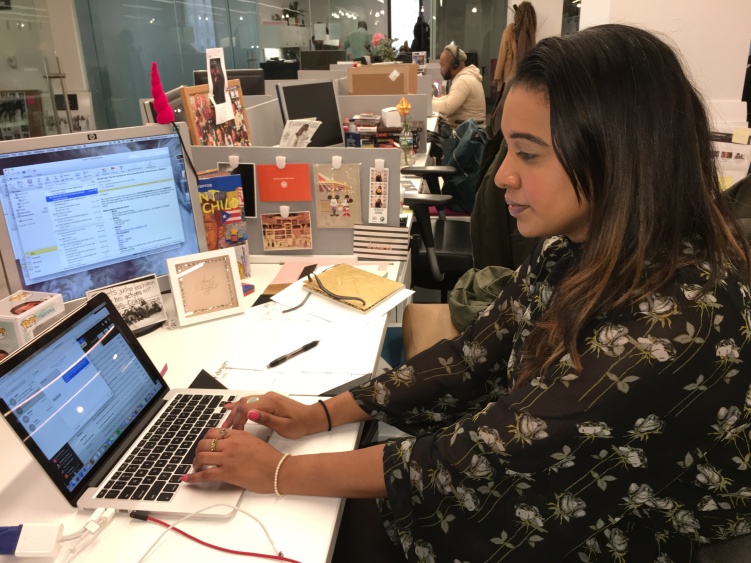

Can you think of a time you were watching a Telenovela or Spanish news with your Abuela as a child?
Did you ever find yourself wondering why didn’t you see someone who looked like you on television?
Like me I too wondered, why darker or brown-skinned Latinos were hidden.
Afro-Latinas are truly underrepresented when it comes to portrayal in Latin American media. This is a topic that is often pushed under the rug and needs to be addressed. Latino media should represent every shade of the Latino community because it holds so much diversity. The only way to get recognition is to raise awareness and this is what will happen today.
In honor of Women’s History Month we are highlighting a few inspirational Afro-Latinas in Media. Each of these women hold an essential role in today’s media and are using their platforms to represent our community in a powerful way.
Jada Gomez-Lacayo
Deputy Editor at Interactive One

What are your roots or background?
I am a bit of a hybrid. My mom is half black and Honduran. Her father is Honduran and her mother is from the Bahamas, so she’s West Indian. I am super proud of that quarter West Indian, too! My father is 100 percent Puerto Rican. Being mixed, I have always been kind of like an anomaly of both sides of black culture and Latina culture. And instead of embracing half and half I’m just like, I’m 100 percent and 100 percent.
So, I am just as proud as black as I am proud to be Latino. I am proud to be a mix of both. Also, being from New York, flags were always important in my house. We would have the American, Bahamian, Honduran and the Puerto Rican flags. I was just taught at a very early age to embrace them and that it was an honor and privilege for me to have that diverse blood. Even though some people may see me as “Other,” or not black or Latina enough, I am enough because I am all those things and I can work in all those circles.
How did your Afro-Latina roots help shape your identity?
Honestly, being at Latina this year has helped shape my Afro- Latina identity. When my parents split up and I lived mostly with my mom. She knows more of her African-American roots, since she was a lot more Americanized. When I’m with my dad I’m around my Puerto Rican /Latino culture. Now, being in this space I am learning about Afro-Latino culture every single day. So, every single day there is something new and I’m so proud.
I didn’t know about Garifuna until someone asked if I identified as Garifuna. Then I started reading about it and then I said, “Mom you are Garifuna! That’s what we are.” So I’ve grown up with that idea that I am Afro-Latina. But now I have gotten empowered and every day I’m learning more about what that means and the people before us, the traditions and how it all meets together. So that’s something I’ve always been proud of. This is the most incredible thing and I am helping my mom learn about her culture now in her 60’s.
What made you fall in love with journalism?
I have been in love with writing since I can tie my shoes. As soon as I was able to get a book and write.
I would rewrite stories in journals and I would make up my own stories. Before I could even read my mom would give me Archie comic books. I would have them on the subway when I was like two or three. I would “read” to her and make up stories based on the photos so everyone thought I could read. But it was just like this amazing thing happened.
Oddly enough, I was pre-med in college but I was a double major. My main goal was to become like Dr. Max Gomez or someone who is a health correspondent on 20/ 20. That’s what I wanted to do at first. I was on both tracks so I did all my pre-med courses and all my journalism broadcasting courses. By junior year I noticed I was so ecstatic about my journalism and magazine classes, and all my sciences felt like something I had to do to please my parents.
I freaked out my dad, but I told him that when I’d graduate I’d have all of my requirements. All I have to do is take the MCAT if I want to go back to medicine. But for the first year out of college I’m going to pursue journalism. Once I started doing that I completely knew this was my calling. That’s what I’ve been doing ever since. The love of telling stories was something I was born with as a baby. I love to tell stories, I loved to read stories, I love to tell people’s stories.
Is there a space for Afro-Latinas in media & journalism? If so where do we stand?
I’ve always felt that there was a lack of information and media devoted to multicultural people in general. Our generation is so diverse. You have Asian parents adopting African children, you have white and Colombian couples having children who are both Latino and Caucasian. And no one really talks about that experience as much as I feel like I’ve seen this year, but it could be a little bit better. When I worked at black publications I would remind editors that the issues like Black Lives Matter is also important to Afro-Latino men. No one is going to say, “Oh, you’re Dominican. You get a pass.” That’s not going to happen when these violent police acts occur.
In my writing. I always put that lens in there so that it speaks to multicultural people in general. I do believe as Afro-Latinas, we have to find ourselves in a bit of different places, not in just one place. I get a little bit of myself in Essence, Vibe Viva or a little bit of myself in Refinery 2. Just to complete that millennial Afro-Latino hybrid that I am. It would be really nice to have more voices and platforms. I think what you’re doing is amazing and there are a couple of other sites I’ve seen on Instagram and Twitter. I am so proud to see that it’s devoted to Afro-Latinas. There is a space and you’re definitely in a good launching spot. The term Latinx took on a role in 2016 and I think it’s going to get bigger as people are trying to understand it. So I commend you for what you’re doing because we need more.
How do you use your platform to inform those on our existence?
I use my platform to be that brown girl anomaly. I am Afro-Latina, I grew up on hip-hop but I’m obsessed with The Bachelor. I love The Bachelor. So if you see on Twitter on Mondays when everyone is tweeting about Love and Hip Hop, I’m the goober tweeting about The Bachelor. When it comes to different quirky things, as a kid in the 90’s I was obsessed with the OJ trial and the Menendez brothers. I am like that goober into those kinds of things that the stereotypical black or Latina girls is not supposed to be into. So I like to use my platform for girls like me. The preppy brown girl.
The one who is most like me is Jane from Jane The Virgin. She means a lot to so many Latinas because she’s not the stereotypical sexy stereotype of what a Latina is supposed to be. She is a total love bug, into romantic movies and she’s a mama’s girl. I try to use my platform to embrace that girl and also for multicultural people. If a girl is following me and she’s biracial or Afro – Latina, they can feel like, there’s one girl out there who gets me and she’s not talking down to me. I don’t want to ever feel like I’m drilling people down with what they should be doing. This is what I’m doing. I’m just as goofy as you and I love yoga and lattes. I also know all the Biggie lyrics.
The last part would be health and fitness. I talk a lot about going to the gym, boxing and yoga. I’m not into diets but I like to eat clean. I’m really big on that as well because you don’t see a lot of women in general embracing a healthy lifestyle that’s not around dieting or getting skinny. I like to also bring that into my social persona.

Where does the future stand with representation of Afro-Latinas at Latina magazine?
With me being there I defiantly helped bring more awareness to Afro-Latinas and millennials and what we think. When you have a brand like Latina that’s 20 years old, it’s a legacy brand. Legacy brands are amazing because people respect the name but then people expect a certain type of content. So they expect what we were doing 20 years ago. When we change, we are a different generation, and we have different concerns. Where Selena was revolutionized back in her time because we didn’t have that pop star beautiful wholesome figure, we’re now in a place where we have our celebrities, but who’s behind the camera? Who’s behind the business? Why do we just see the Sofia Vergara’s of the world?
Why aren’t we seeing other people? Even if you look at Love and Hip Hop, even though you might not agree with Cardi B., people respect what she’s saying. She’s a conversation we need to be having. So the people we may have traditionally ignored I like to bring them in. My mission there was to make sure if you’re a Latino, Afro-Latino, Mexican, Anglo-Latino or LGBTQ Latinx you should be able to see yourself. It should be a place where we’re not the stereotypical version of what America sees of us. We are whatever we see ourselves as. So that’s what you can expect to see.
Again with our Afro-Latina content we have some amazing culture writers that we are obsessed with, Raquel Reichard and Barbara Gonzalez. I absolutely adore them. They are feminists, pro-LGBTQ and they both identify as Afro-Latina. They are at the helm of our Political and Cultural content so it can’t get any better in 2017!
@goldenladyj
Raquel Dailey
Founder & Blogger of Boriquachicks.com


How essential was creating an Afro-Latina lifestyle website?
It was important for me to create a space that I, and others like myself, could identify with. There were other Latina sites in existence, but I wanted to share a site that Afro-Latinas could relate to in a personal way. I grew up reading my mother’s Latina magazine. Yet I saw no images of me. I knew there were other Afro-Latinas out there, but why weren’t we shown or talked about?
At the start of the Boriqua Chicks site, were there any other resources for Afro-Latinas at the time?
When I began BoriquaChicks.com, it started off as just an entertainment site. I searched for websites that offered an Afro-Latina perspective, but I found none. Most of what I found were documentaries. That’s when I slowly began to expand and create my own Afro-Latina digital channel, where not only celebrities would be discussed, but everyday people could share their stories.
Do you believe the representation of Afro-Latinos have changed in a positive light? Is there more to be done?
Since I began my site 7 years ago, I do believe that there has been more representation of Afro-Latinos, but I definitely feel that more work needs to be done. I don’t want this movement to be treated as a trend, which I have been noticing lately, but more of a positive movement that organically integrates us into a forward-moving conversation.
Did you face any tribulations as an Afro-Latina blogger if so how did you overcome them?
I wouldn’t say tribulations, more interesting experiences. At times, my sister and co-blogger Rebecca and I, have attended Latino and/or Puerto Rican events and the reaction was, ‘wow, you’re Puerto Rican?’ It comes as a surprise, as if there are no Black Puerto Ricans.

How can we better increase Afro-Latina representation across all media platforms?
Rebecca and I believe that we must keep it real and honest when it comes to representation. We should continue sharing our stories. Everyone has a story and it’s not the same. We are Black Puerto Ricans from the south side of Chicago, but grew up spending our summers in Puerto Rico. We’ve found that sharing our stories, and other people’s stories, inspires our Afro-Latina peers to feel comfortable sharing theirs. Since we began BoriquaChicks.com, many of our readers have felt empowered to become more vocal about their identity journey. We would encourage other media platforms to acknowledge, celebrate, and embrace Afro-Latinas in an organic and fresh way—whether that be in the digital space, film, television, etc.

Boriqua Chicks has paved the way for many other Afro-Latina blogs, what’s your strategy to maintain your online presence and represent our community?
Thank you for that acknowledgement! We’ve been on the scene since 2010 and many other brands (competitors) have told us that we initiated their spark to create Afro-Latina platforms. I believe our strategy is to continue to be as authentic as possible. We can’t be anyone else but who we are as we continue to offer “a fresh, urban, Afro-Latina perspective.” You may see some rachet social media posts and then you will also see us personally respond to a Puerto Rican mom who wrote us about what to tell her daughter when she asks if she is Black. When we write blog posts and post content to social media, that’s us, that’s our voice. Some people vibe with us and some people are very critical of our flow—but at the end of the day you can’t please everyone and we’ve yet to have a hater pay our bills. So we will continue to be authentic, walk in “our” truth and inspire others to walk in “theirs.”
@raquelrenee1
@boriquachicks
Marjua Estevez
Senior Editor at Vibe Viva



